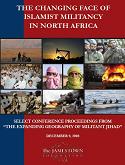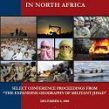The Changing Face of Islamist Militancy in North Africa
By:

*This is a Premium Report. Click Here to Order a Copy of This Report Online!*
The report includes presentations by Theresa Whelan (Deputy Assistant Secretary of Defense for African Affairs, Office of the Secretary of Defense); Andrew Black (Managing Director, Black Watch Global); Andrew McGregor (Editor, Terrorism Monitor, Jamestown Foundation); and Camille Tawil (Al-Hayat newspaper)
Executive Summary
It might be said that the Islamist insurgency in North Africa has entered its second phase, one that follows the failure and collapse of the first wave of Islamist militancy that rolled through this vast region in the 1990s. Having suffered defeat in Algeria, Libya and Egypt, a second wave of Islamist militants is organizing in North Africa. Many of these fighters have absorbed important tactical lessons and techniques learned in the urban battlegrounds of Iraq or the rural campaigns of the Taliban in Afghanistan. Though not great in numbers, these second generation mujahideen have the potential to threaten the political and economic stability of the region. The new holy warriors are less interested in nationalism than in the “global jihad” espoused by al-Qaeda, an organization with which many of these fighters continue to maintain close ties.
In an effort to understand these changes in the North African security environment, Washington D.C.’s Jamestown Foundation organized a special panel on “The Changing Face of Islamist Militancy in North Africa” as part of its December 9, 2008 annual conference. The panel addressed the region’s new security challenges in a variety of ways:
Theresa Whelan examined the response of the U.S. Department of Defense to the proliferation of Islamist militant groups in North Africa and the creation of a new and separate military command to deal with the situation; AFRICOM.
Andrew Black addressed the changing tactics, strategy and ideology of jihadi groups in the Maghreb, paying special attention to the transformation of Algeria’s nationalist-Islamist movement into an al-Qaeda affiliated group focused on the global jihad and specializing in previously rare suicide attacks on the Algerian government and security structure.
Camille Tawil gave a detailed examination of the rise and fall of the Libyan Islamic Fighting Group (LIFG), a militant Islamist group that followed military defeat in Libya by disillusionment with al-Qaeda’s methods in Afghanistan.
Andrew McGregor looked at the broad range of Islamist threats to the foreign-dominated oil industry in North Africa, which includes new players from Asia struggling to cope with insurgent movements and more spontaneous attacks from tribal and religious communities.
Main points delivered by the panel included:
Arab fighters currently in Iraq can be expected to return to their native countries in North Africa with new skills in organizing insurgent and terrorist operations.
The nationalism that once fuelled mujahideen activities in North Africa is giving way to a new emphasis on the global jihad, reinforced by ties to al-Qaeda
The creation of a separate U.S. military command for Africa, AFRICOM, will give U.S. authorities new options in dealing with terrorist issues in North Africa, but will also become a target for militants who claim AFRICOM is designed to seize North African resources.
*This is a Premium Report. Click Here to Order a Copy of This Report Online!*
** Disclaimer: Books and reports take an average of 2-4 weeks for delivery after receipt of payment unless prior arrangements are made upon special request**




